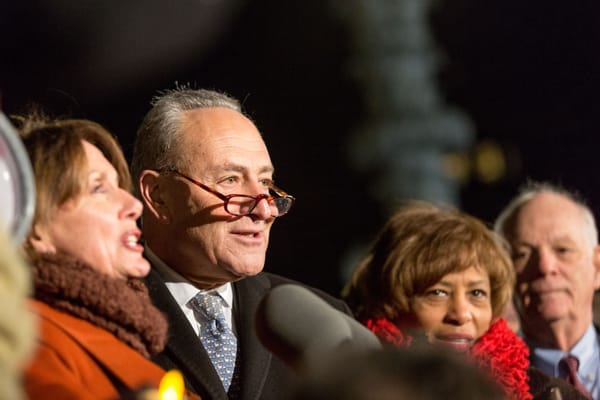Over the past few years, Democratic strategists and pundits have debated the merits of “popularism”—the seemingly banal yet controversial idea that the party should run on the elements of its agenda that poll well and put less effort into appeasing left activist groups and young staffers on issues like defunding the police. A year ago, in a widely read profile of leading popularist David Shor, The New York Times’s Ezra Klein suggested this year’s midterms would be a test of popularism’s theory of politics. At the time, Shor was warning that a GOP rout was near inevitable due to Democrats’ collapsing support outside affluent, educated, urban bubbles.
The results are now in. Shor’s projected Götterdämmerung was averted; Democrats exceeded expectations and, contrary to his predictions, may even hold onto the Senate. This, even though the party didn’t embrace any coherent agenda of the sort Shor and other popularists promoted. Rather than emphasizing bread-and-butter issues of immediate concern to average voters, the party channeled much of its energy to solemnly intoning about the alleged threat posed by Republicans to democracy itself—and did just fine. The likely takeaway for party insiders is that other than continuing to keep the lid on a few egregious progressive causes du jour, there is no real need for a course correction.
That isn’t to say the popularists’ exhortations fell entirely on deaf ears. In particular, many Democrats distanced themselves from the “defund” and “abolish” agenda that enjoyed a vogue back in 2020. Candidates in difficult races, like Senate hopeful Catherine Cortez Masto in Nevada, emphasized their “tough-on-crime” credentials and promised to fund law enforcement; at some point during his ultimately victorious run for the Pennsylvania Senate seat, John Fetterman’s campaign expunged references to Black Lives Matter from its website. Moreover, Democratic candidates largely kept their distance from the high-profile progressives of The Squad.
Nonetheless, the Democrats responded to the issues most voters viewed as most important this year—in particular, inflation and crime—with denial and obfuscation. Even sympathetic outlets lambasted their dishonest, incoherent messaging on this front, and predicted it would come back to bite the party.
Then there was the audacious two-step of proclaiming “democracy is on the ballot” because of GOP “election deniers”—while at the same time funding the latter’s primary bids on the assumption they were more beatable. Perhaps the #Resistance base bought the democracy-in-peril line, but party strategists apparently didn’t take it too seriously. Their breathtaking cynicism seems to have paid off.
That doesn’t necessarily mean the public bought into the nonstop hysteria about impending fascist takeover. A few weeks before the midterms, The New York Times published a poll that offered mixed signals on the Democrats’ marquee 2022 issue. The paper seemed confused that “voters overwhelmingly believe American democracy is under threat but seem remarkably apathetic about that danger.” The implication was that most voters accepted the Democrats’ premise that democracy was at risk but ranked immediate material concerns more highly.
“Why would Democrats do anything differently now?”
This was an obtuse read on the data: After all, people who believe the 2020 election was stolen from Donald Trump presumably also believe “democracy is under threat”—but draw the opposite conclusion about which party to vote for. Regardless, the “popularist” implication of the New York Times poll would be that the Democrats’ “democracy-versus-fascism” messaging should have been a loser. Likewise, the other big issue the party foregrounded this year, abortion, was only ranked as a top concern by 15 percent of voters.
The Democrats’ respectable midterm showing might be taken as a partial vindication of the popularist thesis. At minimum, some successful candidates, like Fetterman, managed to play down their prior appeals to radical activist groups and tried to emphasize the interests of ordinary Americans on issues like the economy and crime. Yet at the same time, they remained tied to a party whose senile sitting president recently found time to hold an obsequious audience with a trans TikTok influencer, as war raged on in Ukraine and inflation continued to soar.
The result of the Democrats’ unexpected good fortune is likely to be the worst of all possible scenarios for anyone who would like to see the party become something other than a vehicle for progressive plutocrats and their pet activists. It ran a nihilistic campaign brazenly contemptuous of average people. The party leadership has offered no meaningful response to concrete threats—runaway inflation, nuclear war—that recall the darkest periods of the last century, other than to summon up a vague phantom from that same era to hector voters into settling for the status quo. All of that proved sufficient to avoid the midterm blowout.
Why would Democrats do anything differently now?
Things are hardly more promising for the much-vaunted realignment on the other side of the aisle. In the 2016 primaries, Donald Trump somewhat accidentally stumbled on his own “popularist” formula when he proved many Republican voters didn’t have much use for fusionist dogmas like slashing benefits, free trade, and military adventurism. But due to poor follow-through and lack of personnel, he failed to offer a real alternative. Instead, what came easier was a more facile sort of popularism that included, for instance, supporting the vacuous celebrity candidacies of Dr. Oz and Herschel Walker, the first of whom lost while the second is headed for a runoff after underperforming.
If the Democratic establishment, by muddling through the midterms, has likely avoided any real reset, its Republican counterpart has found an opportunity for one. Because of the losses suffered by the former president’s handpicked candidates and other MAGA-aligned elements of the party, GOP insiders are gleefully sounding the death knell of Trumpism—which in effect means a revival of the Paul Ryan-era GOP with an “anti-woke” makeover. Six years after the populist challenges of 2016, the same elements of both parties that laid the groundwork for our ongoing economic and geopolitical catastrophes are again feeling the wind at their backs.
